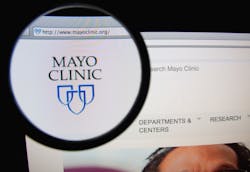Mayo Clinic, Mercy to Collaborate on Distributed Data Network
Mayo Clinic has announced a 10-year collaboration with St. Louis-based Mercy, one of the 25 largest U.S. health systems, with the goal of using data science and years of deidentified patient outcomes to find diseases earlier and start patients on paths to better health more quickly.
Over the past decade, Rochester, Minn.-based Mayo and Mercy have collected a vast amount of treatment outcomes and clinical data from their respective electronic health records. Until recently, the information was too unstructured and complex to analyze. Mayo says that with the combination of privacy-protected, cloud-based technology architecture and the growth of artificial intelligence and machine learning, this aggregated clinical deidentified data generates patterns to pinpoint disease earlier and identify best treatment options.
“This unique collaboration will eliminate the barriers to innovation in healthcare by bringing together data and human expertise through a new way of working together,” said John Halamka, M.D., an emergency medicine physician and president of Mayo Clinic Platform, in a statement. “By working together, we will be able to find the best paths for treatment and diagnosis to benefit patients everywhere. Our union has the potential to transform medicine worldwide.”
All the data are deidentified and secured in a distributed data network that enables Mayo and Mercy to work with an extensive set of outcomes without extracting or transferring data between the organizations. Each healthcare system will retain control over its deidentified outcomes throughout the process. The information will help scientists analyze patterns of effective disease treatment and, more importantly, disease prevention in new ways based upon longitudinal data review over an extended period of time, the organizations said.
The resulting algorithms, Mayo Clinic said, will provide proven treatment paths based on years of patient outcomes, representing the next generation of proactive and predictive medicine that can be used by care providers around the world to access best practices in medical care.
“We have a unique opportunity today to transform mountains of clinical experience into actionable information that optimizes patient care,” explained John Mohart, M.D., a cardiologist and president of Mercy communities, leading operations for all Mercy hospitals, in a statement. “This gives physicians, providers and operational leaders critical information that can ensure patients receive the right treatment at the right time based on millions of previous patient outcomes, while simultaneously improving operational efficiencies and lowering costs. We believe bringing technology and data science to the bedside can provide better patient care, shorter hospital stays and overall better health for people everywhere.”
A press release noted that Mayo has expertise in highly complex care and extensive investment in data science platforms while Mercy has two centuries of innovative care delivery in diverse communities and vast clinical information, including more than 500 million deidentified patient encounters. Additionally, Mercy’s and Mayo’s different populations and geographic locations will improve accuracy, reduce model bias and create more diverse, and therefore stronger, treatment recommendations for patients.
Mercy has more than 40 acute care managed and specialty hospitals, convenient and urgent care locations, imaging centers and pharmacies. It serves patients across Arkansas, Kansas, Missouri and Oklahoma and has clinics, outpatient services and outreach ministries in Arkansas, Louisiana, Mississippi and Texas.


